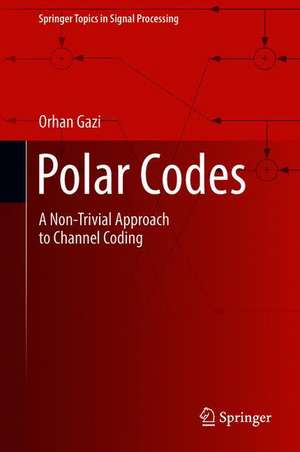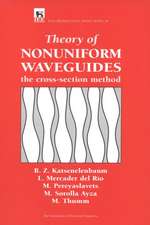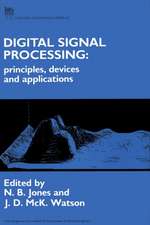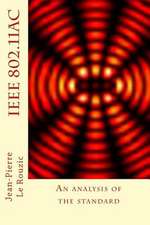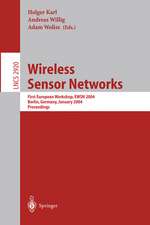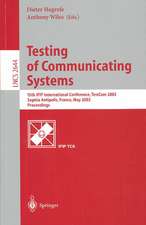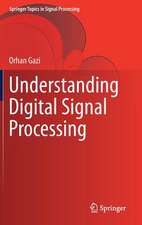Polar Codes: A Non-Trivial Approach to Channel Coding: Springer Topics in Signal Processing, cartea 15
Autor Orhan Gazien Limba Engleză Hardback – 20 iun 2018
The book develops related fundamental concepts from information theory, such as entropy, mutual information, and channel capacity. It then explains the successive cancellation decoding logic and provides the necessary formulas, moving on to demonstrate the successive cancellation decoding operation with a tree structure. It also demonstrates the calculation of split channel capacities when polar codes are employed for binary erasure channels, and explains the mathematical formulation of successive cancellation decoding for polar codes. In closing, the book presents and proves the channel polarization theorem, before mathematically analyzing the performance of polar codes.
| Toate formatele și edițiile | Preț | Express |
|---|---|---|
| Paperback (1) | 775.65 lei 6-8 săpt. | |
| Springer Nature Singapore – 29 dec 2018 | 775.65 lei 6-8 săpt. | |
| Hardback (1) | 781.45 lei 6-8 săpt. | |
| Springer Nature Singapore – 20 iun 2018 | 781.45 lei 6-8 săpt. |
Din seria Springer Topics in Signal Processing
- 18%
 Preț: 953.65 lei
Preț: 953.65 lei -
 Preț: 455.65 lei
Preț: 455.65 lei - 18%
 Preț: 1113.09 lei
Preț: 1113.09 lei - 15%
 Preț: 640.88 lei
Preț: 640.88 lei - 15%
 Preț: 643.48 lei
Preț: 643.48 lei - 15%
 Preț: 640.71 lei
Preț: 640.71 lei - 15%
 Preț: 704.04 lei
Preț: 704.04 lei - 15%
 Preț: 632.33 lei
Preț: 632.33 lei - 18%
 Preț: 940.39 lei
Preț: 940.39 lei - 18%
 Preț: 728.28 lei
Preț: 728.28 lei -
 Preț: 424.61 lei
Preț: 424.61 lei - 15%
 Preț: 647.59 lei
Preț: 647.59 lei - 15%
 Preț: 605.39 lei
Preț: 605.39 lei - 18%
 Preț: 893.40 lei
Preț: 893.40 lei - 18%
 Preț: 947.35 lei
Preț: 947.35 lei - 15%
 Preț: 636.80 lei
Preț: 636.80 lei - 18%
 Preț: 776.88 lei
Preț: 776.88 lei - 18%
 Preț: 889.75 lei
Preț: 889.75 lei - 15%
 Preț: 641.03 lei
Preț: 641.03 lei - 18%
 Preț: 782.72 lei
Preț: 782.72 lei
Preț: 781.45 lei
Preț vechi: 952.99 lei
-18% Nou
Puncte Express: 1172
Preț estimativ în valută:
149.55€ • 155.56$ • 123.46£
149.55€ • 155.56$ • 123.46£
Carte tipărită la comandă
Livrare economică 14-28 aprilie
Preluare comenzi: 021 569.72.76
Specificații
ISBN-13: 9789811307362
ISBN-10: 9811307369
Pagini: 168
Ilustrații: VI, 170 p. 119 illus., 2 illus. in color.
Dimensiuni: 155 x 235 mm
Greutate: 0.43 kg
Ediția:1st ed. 2019
Editura: Springer Nature Singapore
Colecția Springer
Seria Springer Topics in Signal Processing
Locul publicării:Singapore, Singapore
ISBN-10: 9811307369
Pagini: 168
Ilustrații: VI, 170 p. 119 illus., 2 illus. in color.
Dimensiuni: 155 x 235 mm
Greutate: 0.43 kg
Ediția:1st ed. 2019
Editura: Springer Nature Singapore
Colecția Springer
Seria Springer Topics in Signal Processing
Locul publicării:Singapore, Singapore
Cuprins
Information Theory Perspective of Polar Codes and Polar Encoding.- Decoding of Polar Codes.- Channel Polarization of Binary Erasure Channels.- Mathematical Modelling of Polar Codes, Channel Combining and Splitting.- Polarization Rate and Performance of Polar Codes.
Recenzii
“The book is easy to read. It has numerous examples and exercise problems and hence can be used as a textbook on polar codes. I recommend it to engineers who want to learn about these powerful codes. … the book is still useful for many senior undergraduate and graduate students. I enjoyed reading the book.” (Manish Gupta, Computing Reviews, March 07, 2019)
Notă biografică
Orhan Gazi is an Associate Professor at the Electronic and Communication Engineering Department, Cankaya University. He received his BS, MS and PhD degrees in Electrical and Electronics Engineering from Middle East Technical University, Ankara, Turkey, in 1996, 2001, and 2007 respectively. His research interests are chiefly in signal processing, information theory, and forward error correction. Most recently he has been studying polar channel codes and preparing publications in this area. Prof. Gazi has also authored several books on Signal Processing and Information Theory.
Textul de pe ultima copertă
This book explains the philosophy of the polar encoding and decoding technique. Polar codes are one of the most recently discovered capacity-achieving channel codes. What sets them apart from other channel codes is the fact that polar codes are designed mathematically and their performance is mathematically proven.
The book develops related fundamental concepts from information theory, such as entropy, mutual information, and channel capacity. It then explains the successive cancellation decoding logic and provides the necessary formulas, moving on to demonstrate the successive cancellation decoding operation with a tree structure. It also demonstrates the calculation of split channel capacities when polar codes are employed for binary erasure channels, and explains the mathematical formulation of successive cancellation decoding for polar codes. In closing, the book presents and proves the channel polarization theorem, before mathematically analyzing the performance of polar codes.
The book develops related fundamental concepts from information theory, such as entropy, mutual information, and channel capacity. It then explains the successive cancellation decoding logic and provides the necessary formulas, moving on to demonstrate the successive cancellation decoding operation with a tree structure. It also demonstrates the calculation of split channel capacities when polar codes are employed for binary erasure channels, and explains the mathematical formulation of successive cancellation decoding for polar codes. In closing, the book presents and proves the channel polarization theorem, before mathematically analyzing the performance of polar codes.
Caracteristici
Explains the philosophy of the polar encoding and decoding technique Develops the fundamental concepts from information theory Demonstrates successive cancellation decoding, the calculation of split channel capacities, and the channel polarization theorem
